Symptoms and Presenting Concerns of Clients in Greek Life: How Do They Compare With Other Students?
College fraternities and sororities (referred to collectively as Greek life) are a long-standing component of higher education in the United States. Greek life can frequently intersect with treatment and outreach at university counseling centers (UCCs), as certain concerns such as alcohol abuse and sexual assault are reported at higher rates among students in Greek life than students in the general student body (e.g., Zimmerman, 2022). However, less is known about how Greek-affiliated students seeking college counseling services compare with non-affiliated students. For example, while non-clinical Greek-affiliated students report lower depression and anxiety symptoms than non-affiliated students in the general student body (Grace et al., 2022), it is unclear whether this is true among treatment-seeking students as well. A better understanding of Greek-affiliated clients’ symptoms and presenting concerns when they begin counseling could help colleges/universities and UCCs identify intervention, outreach, and general support needs for these students. As such, this blog explored four questions about Greek-affiliated students seeking counseling at UCCs:
- Do Greek-affiliated students report different levels of symptoms than non-affiliated students when they initiate college counseling services?
- Within gender identities (cisgender men, cisgender women, transgender/non-binary), are there differences in symptom levels between Greek-affiliated and non-affiliated students at the beginning of counseling?
- Are there differences in the mental health and treatment histories between Greek-affiliated and non-affiliated students when they enter treatment?
- Do counselors identify differences in presenting concerns between Greek-affiliated and non-affiliated students at the outset of therapy?
To answer these questions, we used data from 30,026 students receiving counseling services from 50 counseling centers during the 2022-2023 academic year. Information related to Greek Life participation status, demographics, and mental health symptom variables were collected from students’ self-report on CCMH’s Standardized Dataset (SDS) and the Counseling Center Assessment of Psychological Symptoms (CCAPS) when they initiated services. Additionally, counselors’ assessment of clients’ primary presenting concerns was gathered from the Clinician Index of Client Concerns (CLICC, which is included in the SDS). Overall, 12.3% of students (3,688) reported involvement in Greek Life.
Do Greek-affiliated students report different levels of symptoms than non-affiliated students when they initiate college counseling services?
At their first counseling appointment, Greek and non-Greek-affiliated clients reported similar levels of symptoms in most areas (Generalized Anxiety, Academic Distress, Eating Concerns, Frustration/Anger, Overall Distress). However, Greek-affiliated students reported lower depression and social anxiety symptoms but higher levels of alcohol use (e.g., doing something they regretted because of drinking in the past 2 weeks). This suggests that in spite of similar levels of distress in some areas and significantly lower in other areas (Depression, Social Anxiety), Greek-affiliated students may be at higher risk of alcohol abuse symptoms. Table 1 in the Appendix displays results of t-tests comparing CCAPS scores of Greek-affiliated and non-affiliated clients.
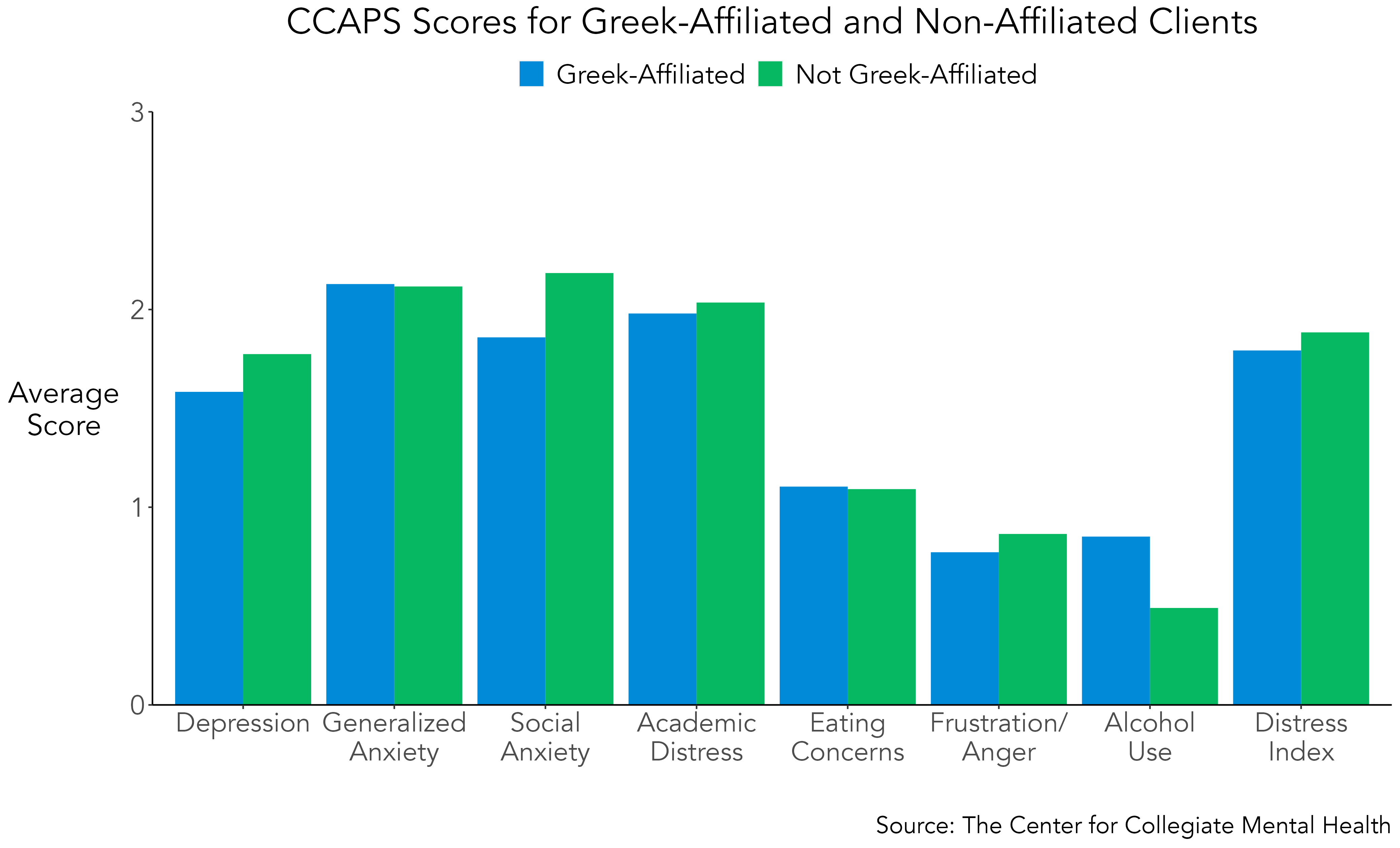
Within gender identities (cisgender men, cisgender women, transgender/non-binary), are there differences in symptom levels between Greek-affiliated and non-affiliated students at the beginning of counseling?
The overall differences in symptom severity between Greek-affiliated and non-affiliated clients were generally the same for cisgender men, cisgender women, and transgender/non-binary clients, although transgender/non-binary clients were affiliated with Greek life at lower rates than cisgender men and women. Consistent with the overall results above, Greek-affiliated clients of all genders reported lower depression and social anxiety but higher alcohol abuse symptoms. Greek-affiliated and non-affiliated clients’ symptoms of Generalized Anxiety, Academic Distress, Eating Concerns, Frustration/Anger, and Overall Distress were similar across the various gender identities. Results of statistical tests are in Table 2 in the Appendix. Taken together, this suggests that the differences in symptoms between Greek-affiliated and non-affiliated clients are generally consistent regardless of clients’ gender.
Are there differences in the mental health and treatment histories between Greek-affiliated and non-affiliated students when they enter treatment?
Since differences between Greek-affiliated and non-affiliated students’ symptoms were similar regardless of gender, we examined prevalence of mental health and treatment history variables for all genders combined. Greek-affiliated clients were significantly less likely than non-affiliated to have histories of trauma, serious suicidal or homicidal ideation, and suicide attempt(s). Greek-affiliated clients were also less likely to report a history of counseling, psychotropic medication usage or a psychiatric hospitalization. See Table 3 in the appendix for results of statistical tests comparing these variables.
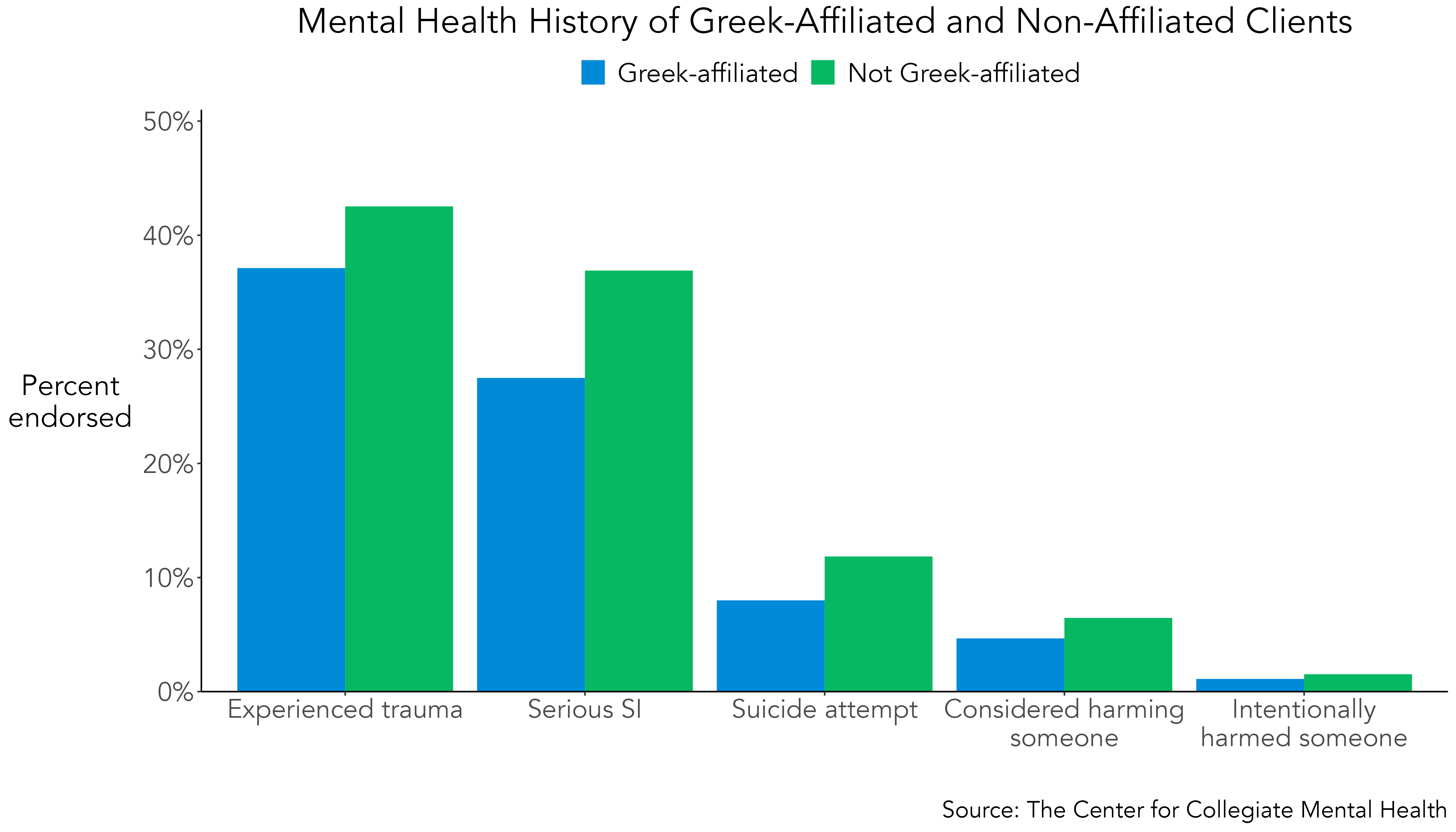
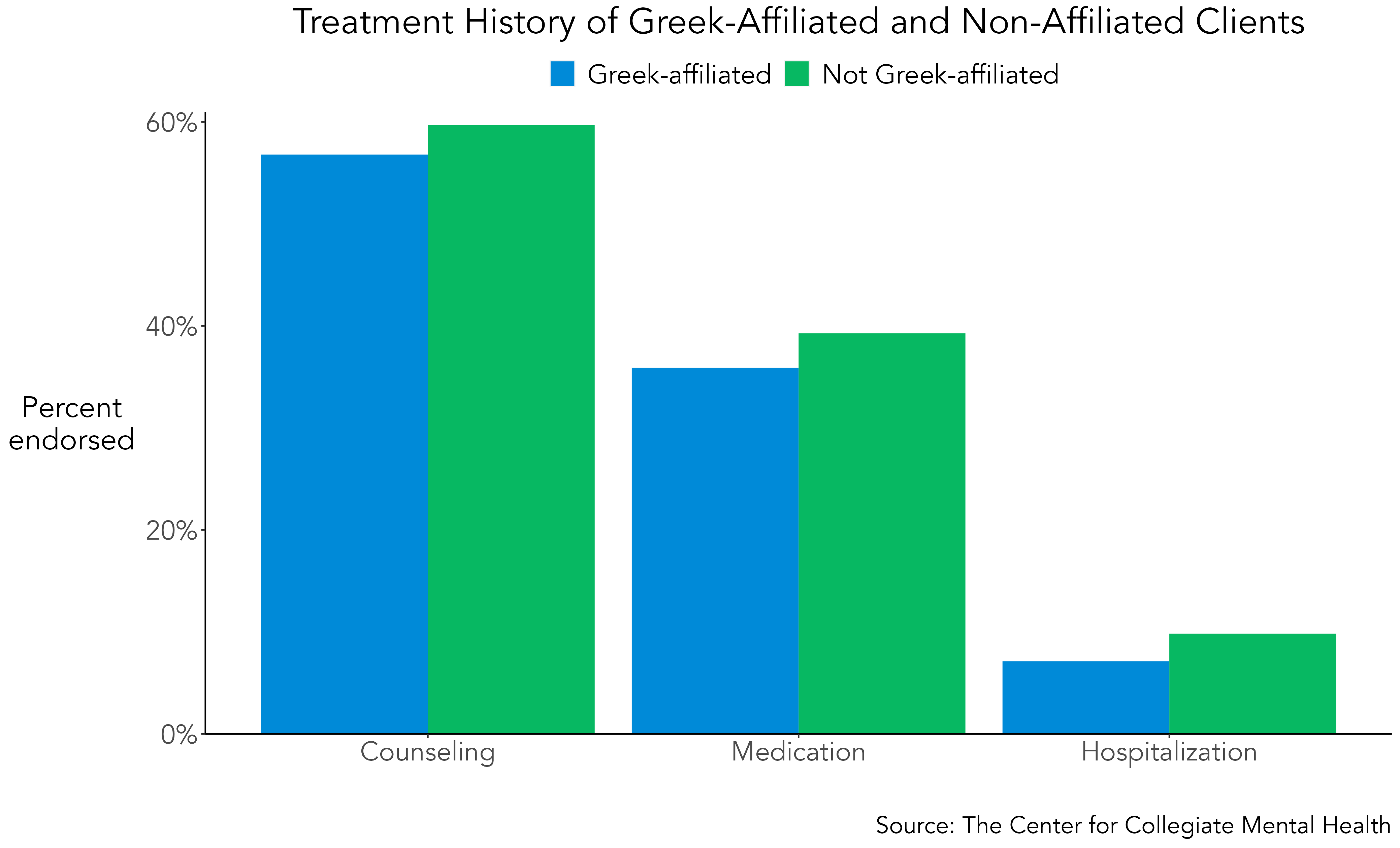
Do counselors identify differences in presenting concerns between Greek-affiliated and non-affiliated students at the outset of therapy?
The table below displays the 10 presenting concerns most frequently identified by clinicians as a client’s top/primary concern within both Greek-affiliated and non-affiliated groups. Counselors were more likely to identify generalized anxiety and relationship problems (specific) as the top presenting concerns for clients in Greek life. However, they were less likely to report trauma as the top presenting concern. Frequency of other presenting concerns were similar between the two groups. See Table 4 in the Appendix for results of statistical tests comparing the prevalence of presenting concerns.
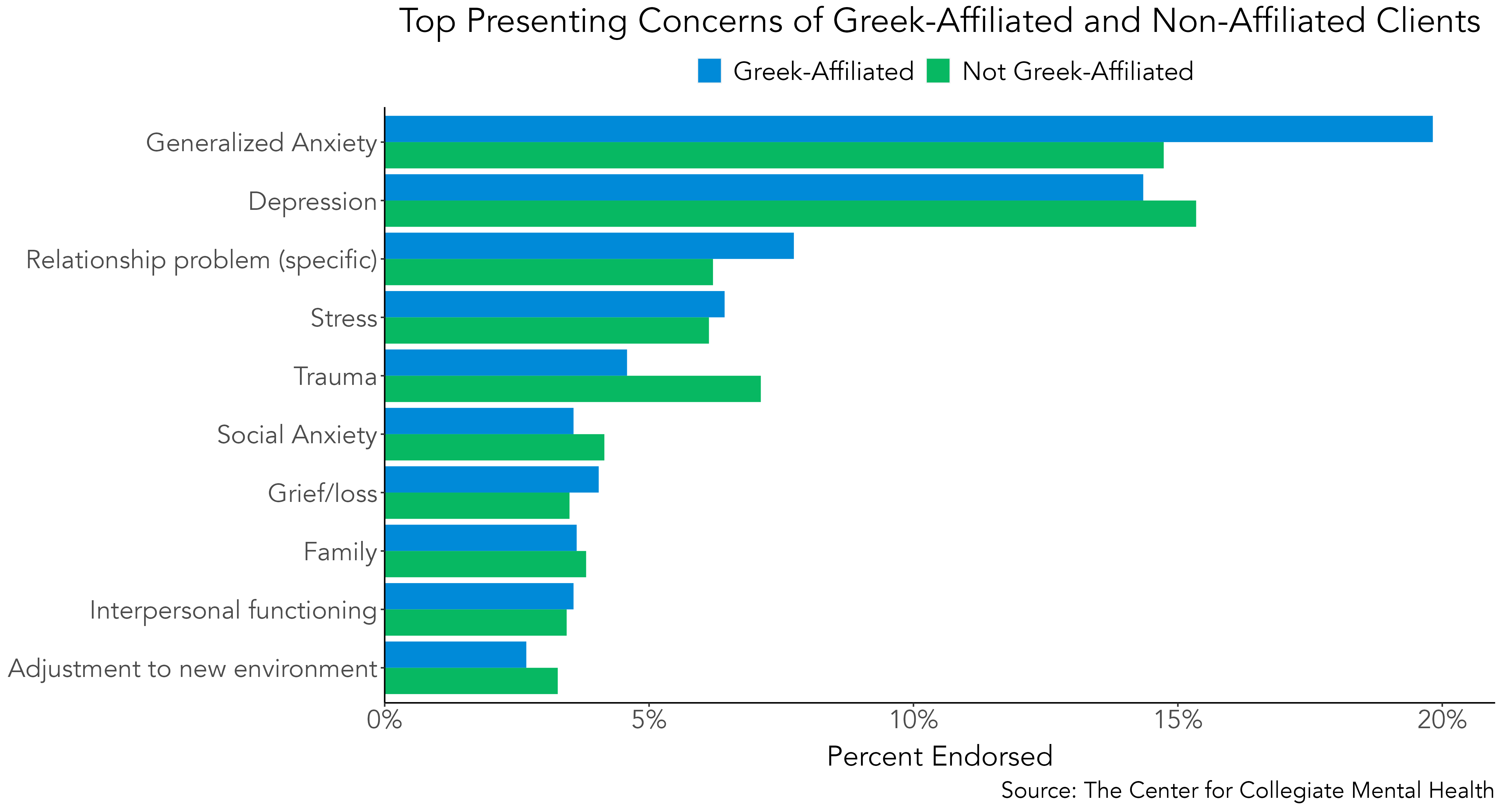
Note. Percentages are taken from counselors’ report on the Clinician Index of Client Concerns.
Summary and Implications
The following takeaways are noted:
- Clients affiliated with Greek life tend to report lower levels of social anxiety and depression symptoms than clients from the general student body at the beginning of counseling. However, Greek-affiliated clients also report higher levels of alcohol-related symptoms. These differences in symptoms at the start of treatment are largely consistent regardless of clients’ gender identity.
- Although Greek-affiliated clients do not report higher levels of generalized anxiety symptoms than other clients, they are more likely to be assessed with generalized anxiety as their top/primary presenting concern by their therapist. This suggests that generalized anxiety is an issue that Greek-affiliated clients seek treatment for more often than other students, even though this is not reflected in the differences between self-reported symptoms.
- Greek-affiliated clients are more likely to present with a specific relationship problem than other clients, but they also report lower levels of social anxiety symptoms. This could be because fraternities and sororities attract students who might already be comfortable in social situations, but the communal living and engagement environments that are characteristic of many Greek life programs may increase risks for specific interpersonal problems or conflicts.
- Clients with a Greek affiliation are less likely to endorse mental health history variables that are often indicators of more chronic or severe concerns (e.g., histories of psychotropic medication usage or psychiatric hospitalization, history of trauma, suicidal ideation or behaviors). The reduced rate of these factors within the Greek-affiliated students suggests lower severity/chronicity of mental health concerns among Greek-affiliated clients, perhaps even before entering college. This could be one reason why they, on average, present to treatment at counseling centers with lower symptoms in many areas.
- Because of high rates of alcohol use symptoms amongst Greek-affiliated clients, counselors are encouraged to consistently assess alcohol use within this community and use evidence-based techniques to build clients’ motivation and skills for moderating alcohol use (e.g., motivational interviewing, harm-reduction strategies). Alcohol-related outreach to fraternities and sororities may also be useful to provide needed information and resources.
- In addition to alcohol-related interventions, Greek-affiliated clients may benefit from outreach and intervention related to managing generalized anxiety and interpersonal conflicts, since these are especially common presenting concerns in this population.
- While Greek life is commonly organized by binary gender identities, it is notable that a subset of Greek-affiliated clients identify as transgender/non-binary. Counselors may need to be mindful of the experiences of these students within Greek life by assessing the extent to which their fraternity or sorority is affirming of their identity and exploring their experiences both within and outside of the Greek life community.
- Finally, we note that the findings based on this data are cross-sectional comparisons. That is, the analyses are comparing groups of students at one-point in time, and thus there cannot been any conclusions made regarding whether involvement in Greek life causes students to display the reduced symptoms and problems that were discovered in this investigation. For example, differences in histories of trauma and mental treatment (psychotropic medication, psychiatric hospitalization), which are well known know to correlate with mental health distress, may account for these contrasts. Nevertheless, these findings indicate that college counseling clients with a Greek affiliation may be especially likely to benefit from support surrounding alcohol use, specific relationship concerns, and generalized anxiety symptoms.
References
Grace, M. M., Assalone, A. E., Johnson, H. M., Svoboda, B. L., & Biddix, J. P. (2022). The role of fraternity/sorority affiliation in supporting college student mental health and wellness. Oracle: The Research Journal of the Association of Fraternity/Sorority Advisors, 17(2), 19-33. https://doi.org/10.25774/0jr1-t352
Zimmerman, B. (2022). A comparison of sorority women and non-sorority women’s alcohol use: Perception, rate of use, and consequences [Doctoral dissertation, Old Dominion University]. ProQuest Dissertations & Theses Global. Retrieved from https://www.proquest.com/docview/2721244895?pq-origsite=gscholar&fromopenview=true
Appendix
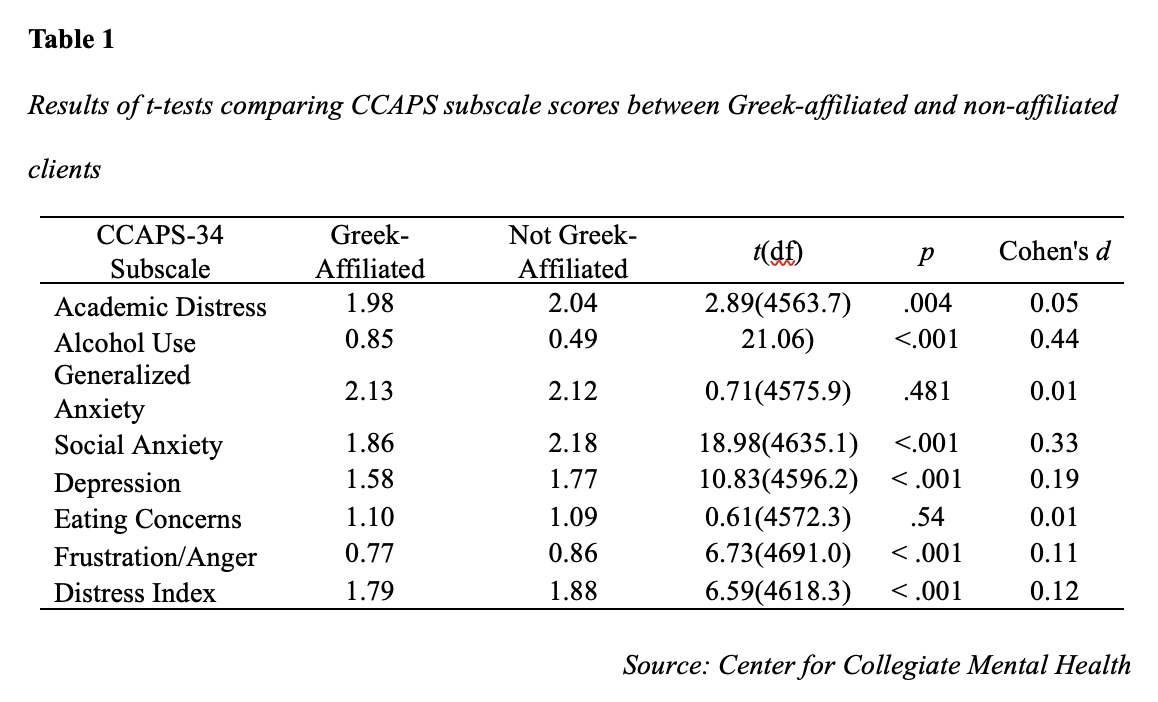
Note. Numbers in the first two columns are mean CCAPS scores at the first administration. CCAPS-34: Counseling Center Assessment of Psychological Symptoms-34. Using Cohen’s d, effect sizes smaller than 0.20 are considered weak/trivial.
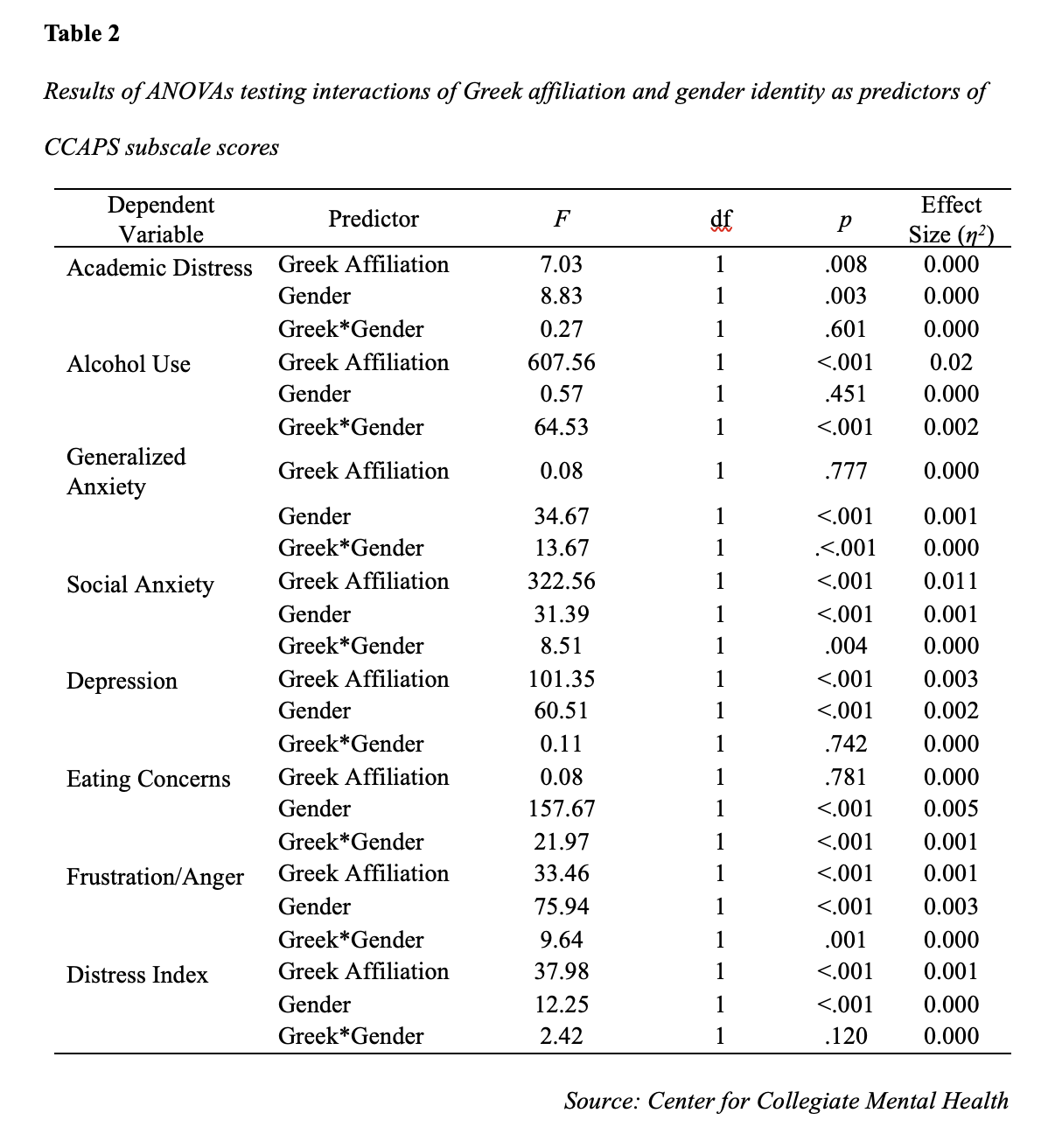
Note. Greek Affiliation: yes/no, Gender: cisgender woman, cisgender man, transgender/non-binary. Using η2, effect sizes smaller than 0.01 are considered weak/trivial.
There were 17,382 cisgender women (2,408 (13.9%) of whom were in Greek life), 9,793 cisgender men (1,109 (11.3%) of whom were in Greek life), and 2,851 transgender and non-binary clients, 171 (6%) of whom were in Greek life.
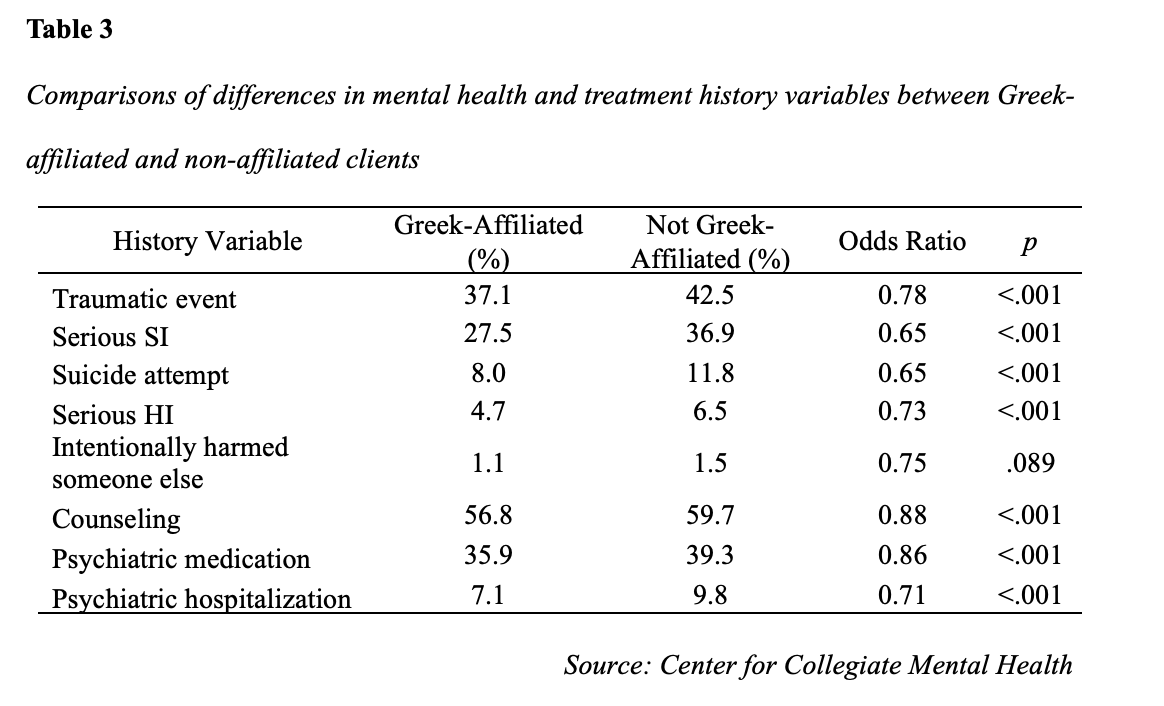
Note. Odds ratios greater than 1 indicate that Greek-affiliated clients were more likely to endorse a given history variable than non-Greek-affiliated clients. p-values are for Fisher’s Exact Test.
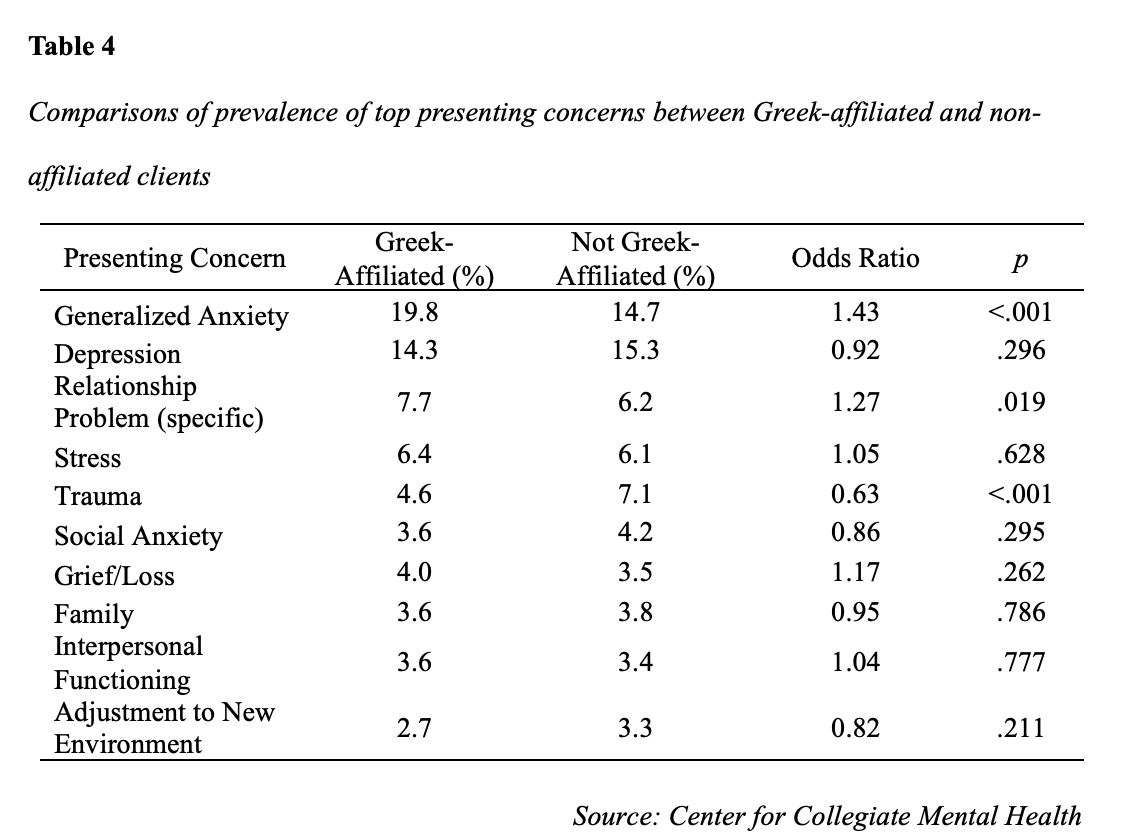
Note. Odds ratios greater than 1 indicate that Greek-affiliated clients were more likely to present with a given concern than non-Greek-affiliated clients. p-values are for Fisher’s Exact Test.
This blog post was written by CCMH Post-Doc, Wilson T. Trusty, Ph.D.

